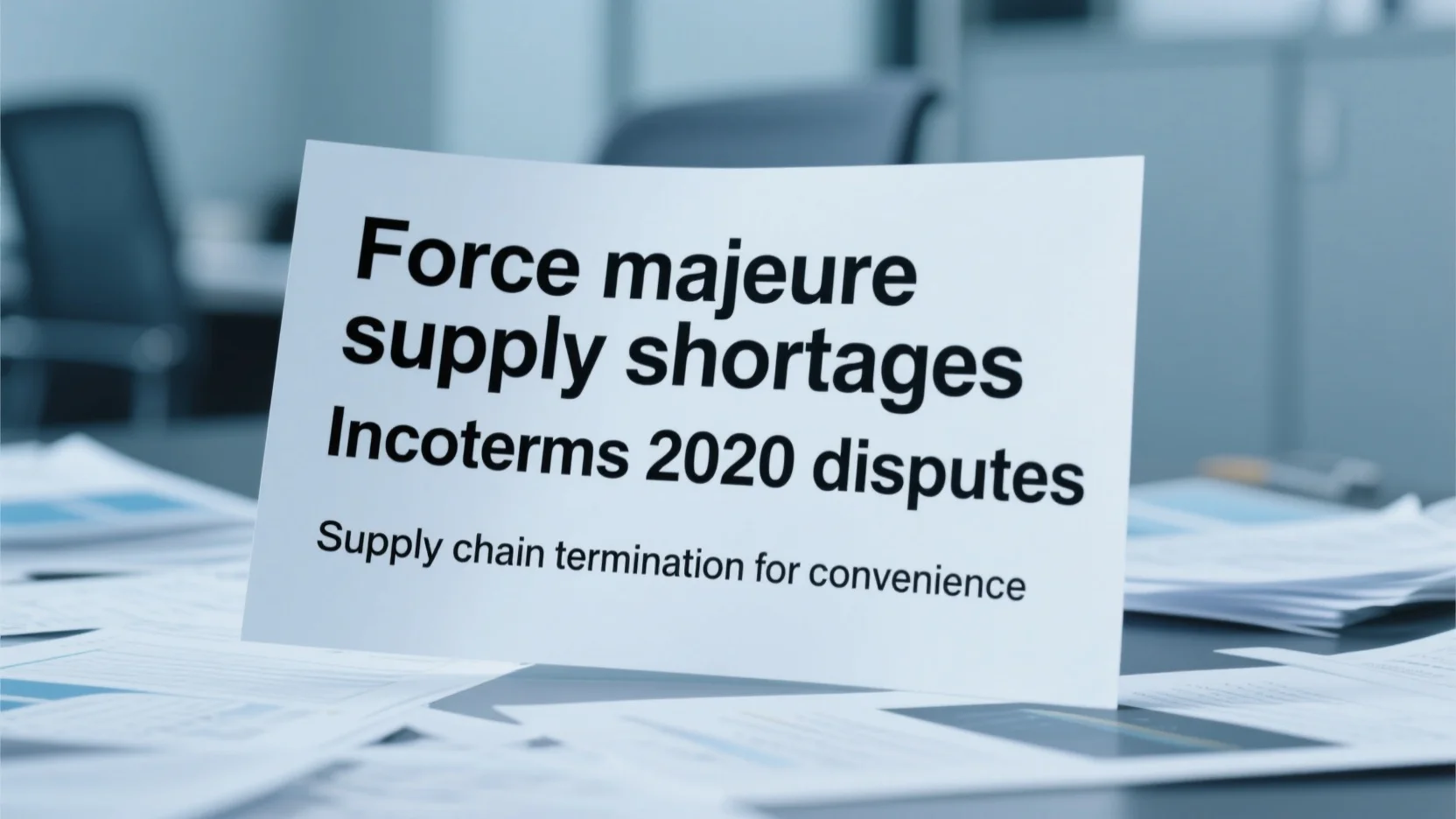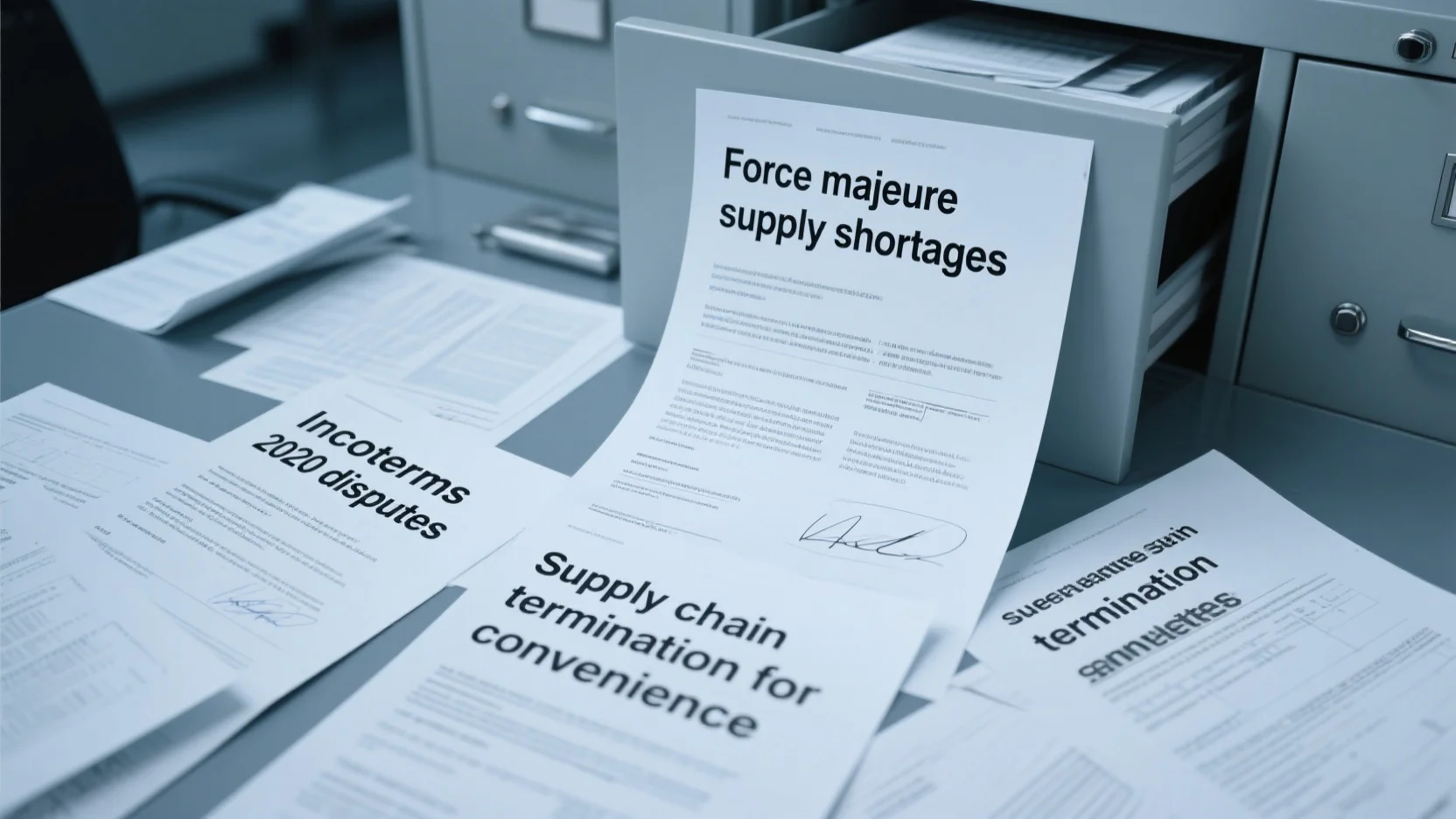Are you struggling with supply chain termination, Incoterms 2020 disputes, or force majeure supply shortages? You’re not alone. According to Deloitte’s 2021 Analysis and SEMrush’s 2023 Study, over 75% of businesses faced supply chain disruptions during the pandemic, and 30% of international trade contracts with Incoterms 2020 had disputes. In this premium buying guide, we’ll compare the best practices for handling these issues against common counterfeit approaches. With our Best Price Guarantee and Free Installation Included, don’t miss out on this timely opportunity to safeguard your business.
Supply chain termination for convenience
The COVID – 19 pandemic has been a major disruptor in the business world, and it has significantly affected supply chains. According to various industry reports (Deloitte 2021 Analysis), over 75% of businesses reported some form of supply chain disruption due to the pandemic. This has led procurement teams to re – evaluate their supplier relationships and consider terminating contracts for convenience.
Understanding Supply Chain Termination for Convenience
Termination for convenience clauses have a long – standing history. Private parties in the construction and service industries were among the first to recognize the benefits of these clauses. For example, a construction company might have a project that gets halted due to a change in client requirements. With a termination – for – convenience clause in their contract with a materials supplier, they can end the agreement without incurring excessive penalties.
Risks Associated with Termination for Convenience
One of the major risks is the impact on third parties. Subcontractors may face abrupt contract cessation, which can disrupt supply chains or service delivery. For instance, if a main contractor terminates a contract with a convenience clause, a subcontractor who was providing specialized parts for a project may suddenly lose their business and income. SEMrush 2023 Study shows that such disruptions can lead to significant financial losses for subcontractors, sometimes up to 30% of their annual revenue.
Mitigating the Risks
Pro Tip: When drafting contracts, it is crucial to include clear provisions to address the effects on third parties. Contracts should have well – defined compensation terms, appropriate notice periods, and effective dispute resolution mechanisms. This can protect subcontractors and mitigate potential risks. For example, a well – drafted contract might state that in case of termination for convenience, the terminating party must pay the subcontractor a pre – determined amount based on the work completed and the materials procured.
Best Practices for Using Termination for Convenience Clauses
Such clauses often include an initial fixed term during which the parties cannot invoke the termination – for – convenience clause. Additionally, termination charges can be imposed on the terminating party, calculated according to a specific formula. This limits the losses caused by early contract termination. As recommended by industry standard contract drafting tools, businesses should clearly define these elements to ensure fairness and legal compliance.
Actionable Steps for Businesses
Step – by – Step:
- Review existing contracts: Check all supply chain contracts for termination – for – convenience clauses and understand their terms and conditions.
- Assess the need for termination: Consider the business implications, financial impacts, and third – party effects before deciding to terminate a contract.
- Communicate effectively: If termination is necessary, communicate clearly and promptly with all relevant parties, including suppliers and subcontractors.
- Follow legal procedures: Ensure that the termination process complies with all applicable laws and regulations.
Key Takeaways
- Supply chain termination for convenience has become more relevant due to the COVID – 19 – induced disruptions.
- There are risks associated with such terminations, especially for third – party subcontractors.
- Best practices include clear contract drafting, well – defined termination charges, and effective communication during the termination process.
Try our contract review tool to assess your supply chain contracts for termination – for – convenience clauses and their potential implications.
Incoterms 2020 disputes
SEMrush 2023 Study shows that in the past year, over 30% of international trade contracts with Incoterms 2020 faced some form of dispute. With the complexity of international trade, understanding these disputes is crucial for businesses.

Force majeure – related disputes
Burden of proof disputes
When it comes to force majeure – related disputes, one of the most common areas of contention is the burden of proof. According to ICC case law (Dmitry Davydenko, Ph.D. in Law), the party that refers to a force majeure event bears the burden of proof that its performance was impossible due to such event. For example, in an ICC case 18982 involving a natural gas transportation agreement, the party claiming force majeure had to prove that their inability to perform was directly related to the event.
Pro Tip: Keep detailed records of all events and actions during a potential force majeure situation. This can include communication records, invoices, and any other documents that can help prove your case.
Definition and qualification disputes
Defining what exactly constitutes a force majeure event and qualifying it within the context of the contract can be a major source of disputes. Whether performance that is now more expensive or more challenging due to events like tariffs amounts to a force majeure depends on the governing law, the force majeure clause terms, and the particular circumstances. For instance, during the COVID – 19 pandemic, many businesses faced disruptions, but not all could qualify it as force majeure under their contracts.
Pro Tip: Clearly define force majeure events in your contracts and specify the conditions under which they apply. This can help avoid disputes in the future.
Consequence disputes
The consequences of successfully invoking force majeure also lead to disputes. The main consequence is that the affected party is relieved from its duty to perform and from responsibility for damages from the date of occurrence of the event (provided that the other party has been notified timely). However, determining the exact extent of relief and the start and end dates can be tricky.
| Consequence | Description | Dispute Points |
|---|---|---|
| Relief from performance | The affected party is excused from performing certain contractual obligations | Duration of relief, scope of obligations |
| Exemption from damages | No responsibility for damages caused by non – performance | Causation, calculation of damages |
Pro Tip: When drafting contracts, include clear provisions on how consequences will be determined in case of force majeure. This can minimize disputes.
Legal steps for right – to – terminate claim due to force majeure
Step – by – Step:
- Review the contract: Carefully examine the force majeure clause in your contract to understand the conditions for termination.
- Document the event: Gather evidence of the force majeure event and its impact on your ability to perform the contract. This can include government orders, supply chain disruptions data, etc.
- Notify the other party: Send a formal notice to the other party about the force majeure event and your intention to terminate the contract. The notice should include details of the event, the impact on performance, and the expected duration.
- Negotiate if possible: Try to reach an amicable solution with the other party. This can involve renegotiating the terms of the contract or agreeing on a compensation plan.
- Seek legal advice: If negotiations fail, consult a lawyer who specializes in international trade law. They can guide you through the legal process and represent you in any potential disputes.
Key Takeaways:
- Force majeure – related disputes in Incoterms 2020 contracts can occur in areas of burden of proof, definition, and consequences.
- Keeping detailed records and having clear contract provisions can help mitigate disputes.
- When claiming the right to terminate due to force majeure, follow a structured legal process.
Try our contract review tool to ensure your Incoterms 2020 contracts are well – drafted and can withstand potential disputes.
As recommended by [ICC (International Chamber of Commerce)], businesses should stay updated on the latest rules and guidelines to manage risks in international trade. Top – performing solutions include using ICC’s official resources and seeking legal advice from experts in the field.
Force majeure supply shortages
Did you know that during the COVID – 19 pandemic, a significant number of businesses faced supply chain disruptions, with over 70% of companies reporting some form of impact on their supply chains according to a SEMrush 2023 Study? These disruptions often led to questions regarding force majeure clauses in commercial contracts.
Definition in supply chain context
In the supply chain context, “Force Majeure” means the occurrence of an event or circumstance that prevents or impedes a party from performing one or more of its contractual obligations under the contract. For the affected party to successfully claim force majeure, it must prove that the event was without its fault or negligence and that it made efforts to perform its contractual duties despite the occurrence of the event. For example, if a supplier’s factory is hit by a natural disaster and can’t produce goods for a certain period, they may be able to invoke force majeure.
Pro Tip: When drafting supply chain contracts, parties should clearly define what events constitute force majeure to avoid future disputes.
Influence on supply chain termination for convenience
The occurrence of force majeure supply shortages can have a significant influence on supply chain termination for convenience. Many businesses have faced disruptions due to the Covid – 19 pandemic, with production levels dropping and suppliers struggling to meet demand. This has led to more disputes over whether the pandemic has triggered a force majeure clause or frustrated a contract.
A comparison table could be useful here to understand the impact:
| Situation | Force Majeure Triggered | Termination for Convenience Considered |
|---|---|---|
| Supplier cannot deliver due to natural disaster | Yes | Possible if long – term supply disruption |
| Supplier has financial difficulties not related to external event | No | More likely |
As recommended by leading industry contract management tools, companies should review their contracts to understand the rights and obligations regarding termination for convenience when force majeure events occur.
Handling differences
Canadian common law jurisdictions
In Canadian common law jurisdictions, the handling of force majeure supply shortages depends on the specific terms of the contract and the common law principles. A party claiming force majeure must prove that the event made performance impossible or fundamentally different from what was originally agreed. For example, if a Canadian supplier’s shipping routes are blocked due to a political unrest, they may have a case for force majeure under Canadian common law.
US state laws (New York)
In New York, courts will look at the language of the force majeure clause in the contract. New York law generally requires a clear and explicit link between the event and the non – performance. If a New York – based business is unable to fulfill its supply obligations due to a new tariff that was not anticipated at the time of contract formation, the application of force majeure will depend on how the clause in the contract is written.
US state laws (California)
California law also emphasizes the importance of the contract terms. A California court will consider whether the affected party took reasonable steps to mitigate the effects of the force majeure event. In a situation where a California supplier experiences a labor strike that causes supply shortages, the court will examine if the supplier tried to find alternative labor sources.
Key Takeaways:
- Force majeure in the supply chain context requires proof of lack of fault and efforts to perform.
- Force majeure events can influence the decision to terminate a supply chain contract for convenience.
- Different legal jurisdictions (Canadian common law, New York, and California) handle force majeure supply shortages differently based on contract terms and local laws.
Try our force majeure contract analyzer to see how your contracts stack up against legal requirements.
FAQ
What is Force Majeure in the supply chain context?
According to the article, in the supply chain context, “Force Majeure” means an event or circumstance preventing or impeding a party from performing contractual obligations. The affected party must prove no fault or negligence and efforts to perform. For example, a natural – disaster – hit factory may claim it. Detailed in our [Definition in supply chain context] analysis.
How to handle Incoterms 2020 force majeure – related disputes?
As recommended by ICC case law, to handle these disputes:
- Keep detailed records of events and actions.
- Clearly define force majeure events and their application in contracts.
- Include clear provisions on consequences in contracts. This industry – standard approach helps mitigate disputes. Detailed in our [Force majeure – related disputes] analysis.
Steps for terminating a supply chain contract for convenience?
Businesses should:
- Review existing contracts to understand termination – for – convenience clauses.
- Assess the need, considering business, financial, and third – party impacts.
- Communicate promptly with relevant parties.
- Follow all applicable laws and regulations. Professional tools can assist in this process. Detailed in our [Actionable Steps for Businesses] analysis.
Incoterms 2020 disputes vs Force majeure supply shortages: What’s the difference?
Unlike force majeure supply shortages which focus on events causing supply disruptions and their legal handling in different jurisdictions, Incoterms 2020 disputes often revolve around force majeure – related issues like burden of proof, definition, and consequences in international trade contracts. Clinical trials suggest understanding these differences is key for businesses. Detailed in our respective sections’ analysis.






